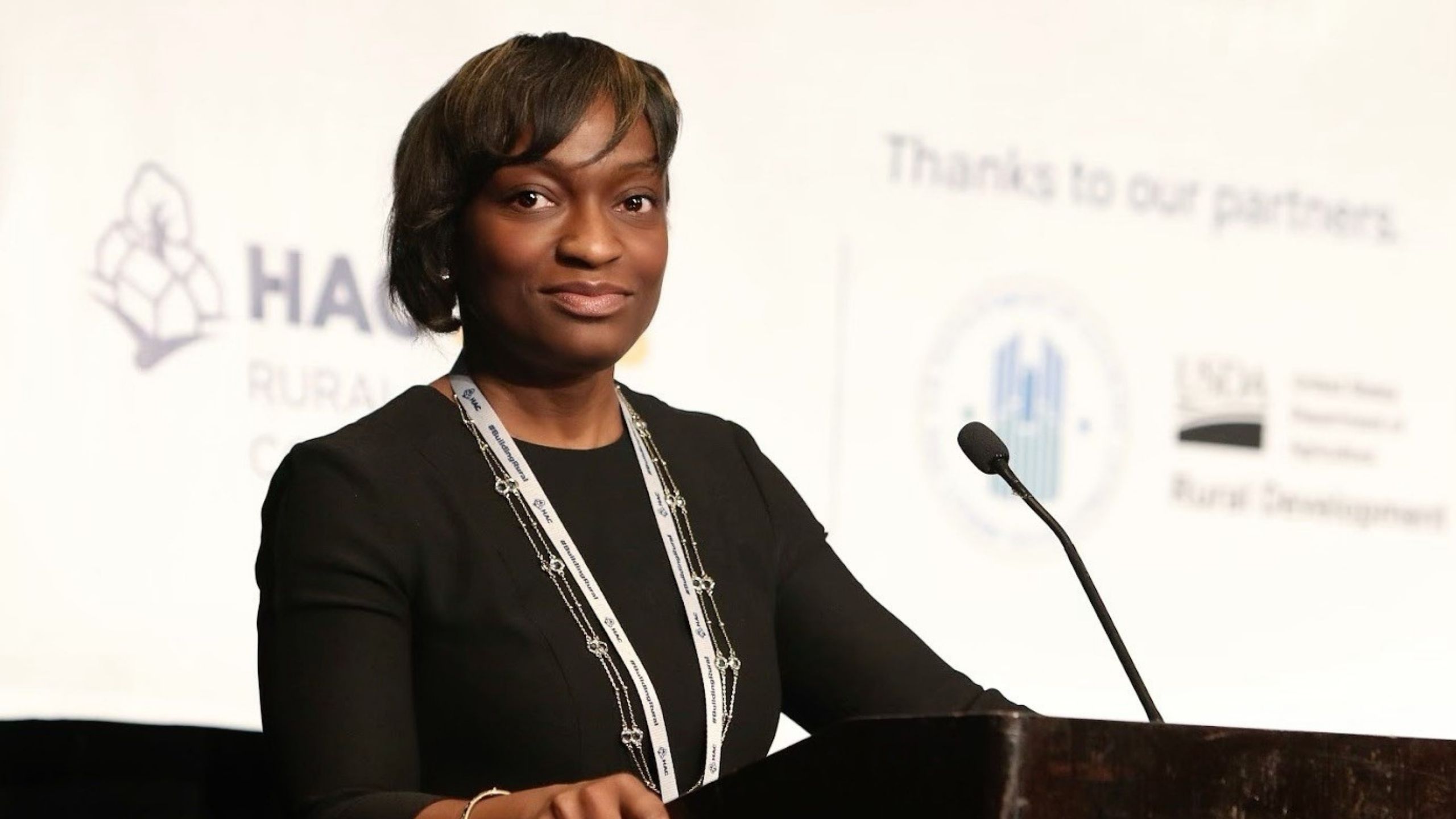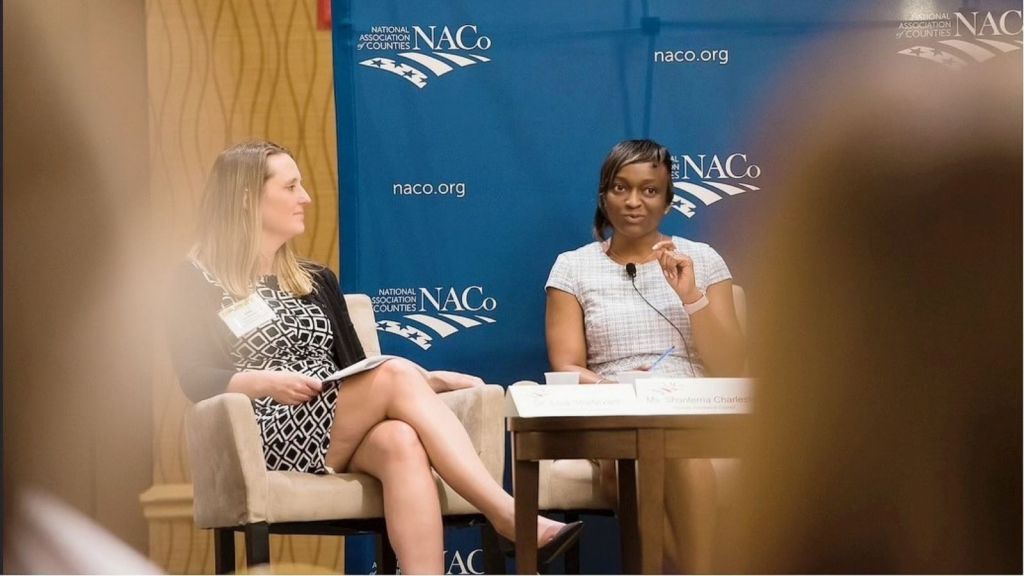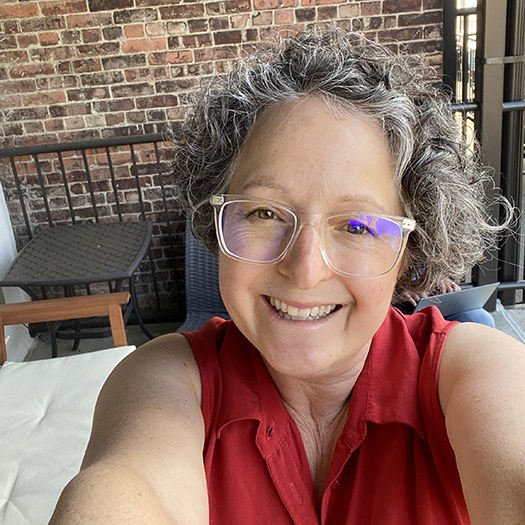Shonterria Charleston supports rural communities, even from a parking lot
When students in a rural area of southern Louisiana struggled with reliable high-speed internet for remote learning, Housing Assistance Council partnered with a local group to turn a parking lot into a community broadband hotspot.
By

To anyone else, it might look like an unremarkable piece of paper. To Shonterria Charleston, it’s an irreplaceable heirloom. It’s there in her scrapbook, a slightly faded piece of paper with a quote in her mother Marian’s elegant handwriting.
“The truest insights into a person’s character: How he treats those who can’t help him and how he treats those who can’t fight back.”
“She was a glass full person,” Charleston said of her mother, who died in 2016. “There was no half with her. That really impacted how I look at the world. Her pursuit to always champion and serve the underdog was how she lived her life. It impacts the standards I set for all my relationships.”
Charleston was born and raised in Atlanta, “right in the heart of the city,” she said. She went to Booker T. Washington High School, joined the Army, and married a military man. She served as an administrative technician, handling paperwork, scheduling, and other managerial support work in postings at Fort Leavenworth, Kansas and Heidelberg, Germany. Charleston’s daughter, Dominique, was born in 1997, while her parents were stationed in Germany. Her arrival persuaded Charleston and her husband that it was time to transition to civilian life.
They left the Army in 1999 and settled in Georgia. Scanning an employment website one day that year, she noticed an administrative job listed at the Housing Assistance Council (HAC), a national nonprofit that supports affordable housing and other development in rural areas. Charleston thought, “Surely I can do that.”
Two decades later, Charleston oversees HAC’s training and technical assistance division. She and a staff of nine provide hundreds of affordable housing, homeless services, and community development organizations with training, research, troubleshooting, organizational development, and other expertise.
A key component of the work is helping groups navigate programs sponsored by the US departments of Agriculture and Housing and Urban Development.
The pandemic has forced Charleston to broaden the kind of assistance her team offers. The shutdown of in-person activities exposed a vulnerability of many rural areas: Individuals and organizations don’t have the broadband access they need to carry on when schools move classes online and governments and civic groups cancel in-person meetings.
Never miss a story.
“It’s a huge issue for rural groups,” Charleston said.
In southern Louisiana, a homeownership counseling agency turned to HAC for help with moving its service offerings online. After the pandemic forced schools to shift to remote learning, HAC helped another group make their office a community broadband hotspot, so parents could pull into the parking lot with kids who could do their online homework on laptops, phones, or school-issued devices in the family car.
“Even though they had to do social distancing, [creating this accessible broadband hotspot] helped them build a sense of community,” Charleston said. “It is a real connector. That’s something we’re going to try and keep, to the greatest extent possible. We’ll encourage more organizations to do that, because not everyone can afford broadband.”
Charleston’s work also includes administering grants to nonprofits, tribally designated housing entities, and housing authorities to renovate, modify or build homes for rural veterans, with a focus on elderly vets who are homeless, catastrophically wounded, or just aging in place.

In partnership with the US Department of Veterans Affairs and supported by the Home Depot Foundation, HAC grantees tackle crucial home improvement projects like new roofing or insulation to head off skyrocketing utility bills.
That work is informed by Charleston’s awareness that some vets have a much harder transition to civilian life than she did.
Her own father, a Vietnam War-era veteran, is an example. “People like my dad were just plucked out of their lives. He never got a chance to get that deep education.” Charleston saw “the difficulty he faced in terms of getting his benefits, being properly respected, feeling as if he didn’t really matter,” she said. “It’s important to me that people feel valued, especially after sacrificing so much.” Charleston also volunteers as a veterans peer coach, coaching veterans with physical challenges or helping older veterans access their benefits. It is, she said, her only hobby.
To sharpen her leadership skills, Charleston is completing the NeighborWorks America Achieving Excellence Program at Harvard University’s Kennedy School of Government. The 16-month executive training program seeks to bolster the capabilities of non-profit leaders so that their organizations become stronger and more resilient.
But to Charleston, knowledge—and inspiration—also come from the people HAC works with and supports.

In September 2020, she moderated a panel discussion featuring remarks by Tawney Brunsch, executive director of Lakota Funds, the first Native community development financial institution.
The panel was part of the Rural Opportunity and Development (ROAD) Sessions, a series of virtual conversations focused on the rural response to COVID-19 and long-term rebuilding and recovery. ROAD Sessions were co-hosted by HAC, the Aspen Institute, the Rural Community Assistance Partnership, Rural LISC, and the Federal Reserve.
Brunsch described an overwhelming shortage of housing on the Pine Ridge Reservation in South Dakota. This shortage has resulted in as many as 17 people living in a 1,200-square-foot home.
“It’s literally, the house is worn out from the inside out,” Brunsch said. “The floors are wobbly. There’s one bathroom. People are sleeping in crawl spaces sometimes.”
Brunsch detailed how her organization and the South Dakota Native Homeownership Coalition worked with local builders on an internship program that connects local youth with local contractors to address the shortages in both housing and jobs on the reservation. At the beginning of last year, the program had 100 interns placed with local contractors, rehabbing old homes and building new ones.
It’s stories like this that hearten Charleston. “I always focus on what keeps me here [at HAC]. It’s the work and the mission of the organization. I am really bought into the mission of serving of the poor.”

